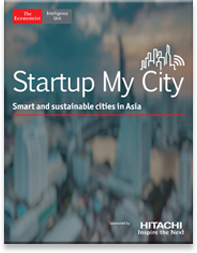
The common denominator, however, is a drive for efficiency: the public sector tries to deliver better services through fewer resources while businesses and citizens demand more. This has driven governments to focus on building smarter and more sustainable cities, which are powered by technologies that can enable them. It is a necessary development due to rapid urbanization and rising expectations.
82% of citizens want their city to create more smart city initiatives
To provide insights into the development of smart and sustainable cities in ASEAN and the Asia-Pacific, The Economist Intelligence Unit (EIU) established an expert advisory board and conducted a survey of 2,000 citizens in 20 cities across ASEAN (Bandung, Bangkok, Danang, Davao City, Ho Chi Minh City, Jakarta, Kuala Lumpur, Manila, Siem Reap, Singapore and Yangon) and Asia-Pacific (Auckland, Chennai, Hong Kong, Melbourne, Mumbai, Seoul, Shanghai, Taipei and Tokyo).

The key findings
from the research are as follows:
- Smart city initiatives are rising in
importance and citizens want more of them:
In part due to rapid urbanization in the region
and in part due to the drive for greater efficiency
among governments, businesses and citizens
alike, the development of a smart city is high in
demand. The survey conducted for this report
shows that citizens are keen for cities to develop
more initiatives that allow them to enhance the
quality of their lives.
- Connectivity is central to both supply
and adoption:
Fixed- and mobile broadband
infrastructure is a necessity to enable smart
city technologies such as the Internet of Things
(IoT), cloud computing and big data, which
can be used to create initiatives such as smart
transportation, energy, waste management and
e-learning programmes, amongst others. Free
Wi-Fi initiatives based on such progress can help
stimulate adoption of smart initiatives among
citizens.
- A wide variety of perceived benefits:
When
asked about the main benefits of a smart city,
citizens cited the environment and education
as the top two benefits, illustrating that the
concept goes well beyond a narrow definition
of technology-enabled services. In fact, easier
access to government services was only the
fourth most cited benefit among survey takers.
- A lack of information is the biggest
impediment to greater usage:
According to the
survey of citizens, it is abundantly clear that they
do not understand what smart city initiatives are
available to them. This appears to stem from a
lack of clear government communication about
current efforts. In addition, experts anecdotally
point to the fact that city leaders can do more
to make the case for return on investment (ROI)
for new initiatives and to enhance marketing of
current ones.
- Partnerships are needed to seize the
full benefits:
Most survey takers believe the
government should take the lead in developing
smart city initiatives; however, there is also
a strong case to be made for public-private
collaboration as well as including citizen users
to seize the full benefits, in areas such as the
development of innovation communities and
leveraging open government data to create new
services and products.

Download the briefing paper
To access the key findings from the research, and insights into the development of smart and sustainable cities in ASEAN and the Asia-Pacific, download the full briefing paper here.








